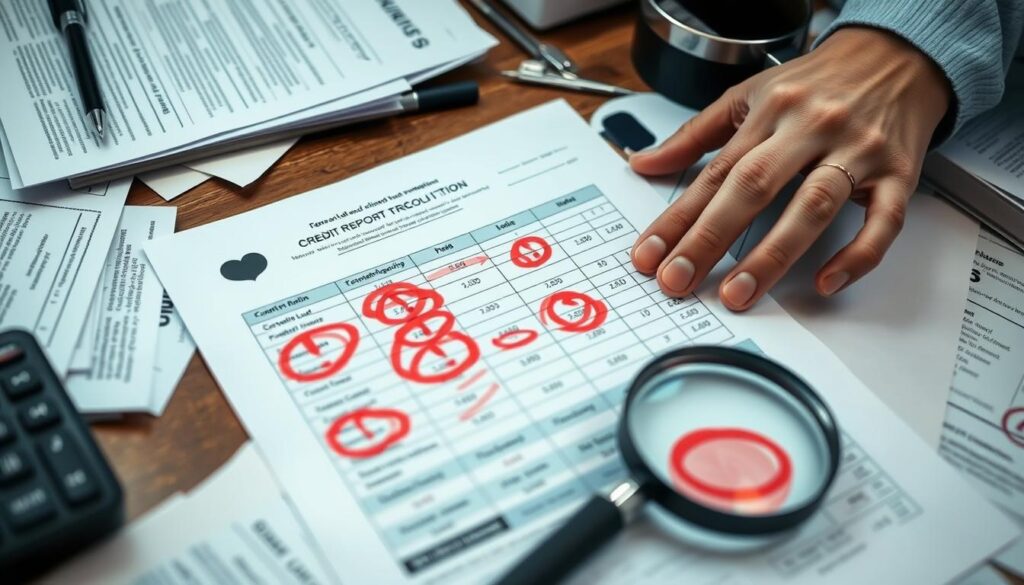Credit report errors can hurt your financial future. They may affect your ability to get loans, credit cards, or jobs. You can challenge these mistakes and fix your credit history.
This guide will help you write an effective dispute letter to credit bureaus. You’ll learn how to spot errors and address them. You’ll also understand your rights as a consumer.
We’ll show you how to improve your credit history’s accuracy. You’ll discover the steps to take for a successful dispute.
Key Takeaways
- Understand the common inaccuracies found on credit reports and their impact on your financial well-being.
- Familiarize yourself with your rights as a consumer under the Fair Credit Reporting Act (FCRA).
- Learn how to obtain your credit reports and gather supporting documentation to build a strong case for your dispute.
- Discover the key components of an effective dispute letter and how to craft a persuasive and well-organized argument.
- Explore the various delivery methods and follow-up strategies to ensure your dispute is addressed promptly.
Understanding Credit Report Errors
An accurate credit report is vital for your financial health. Errors can slip in, affecting your credit score and finances. Knowing common mistakes is key to managing your credit.
Credit report errors range from incorrect account details to identity theft. These mistakes can significantly impact your credit score and overall financial well-being.
Common Inaccuracies on Credit Reports
The most prevalent credit report errors include:
- Incorrect account details, such as incorrect account numbers, incorrect credit limits, or incorrect payment histories
- Accounts that do not belong to you, often a result of identity theft or mix-ups with someone else’s information
- Derogatory marks, such as late payments or collections, that are inaccurate or outdated
- Duplicate entries for the same account
Impact of Credit Report Mistakes
Credit report errors can seriously affect your financial life. They can lower your credit score, making it harder to get loans or credit cards.
These mistakes can also impact your ability to secure housing or employment. Unresolved errors can continue to cause problems for years.
| Type of Error | Potential Impact |
|---|---|
| Incorrect account details | Lower credit score, difficulty obtaining credit |
| Accounts that do not belong to you | Identity theft, lower credit score, financial headaches |
| Derogatory marks | Lower credit score, difficulty obtaining credit, higher interest rates |
| Duplicate entries | Inflated debt levels, lower credit score |
Recognizing common credit report errors helps you take action. Correcting inaccuracies promptly is crucial for maintaining a healthy credit profile.
Your Rights as a Consumer
The Fair Credit Reporting Act (FCRA) protects your consumer credit rights. It ensures credit reporting agencies maintain accurate information about you. This federal law applies to Equifax, Experian, and TransUnion.
The FCRA gives you the right to dispute credit report errors. You can challenge inaccuracies in your credit report. This process holds credit bureaus accountable for the information they report.
Credit bureaus must investigate your dispute within a set timeframe. If they find errors, they must correct or remove the wrong data quickly. This helps maintain the accuracy of your credit report.
Understanding your credit report dispute rights is crucial. It allows you to keep your credit information accurate and fair. This helps maintain a healthy financial profile and access better credit terms.
Your consumer credit rights protect you from unfair reporting practices. By using these rights, you can safeguard your credit. This helps ensure your overall financial well-being.
Preparing to Dispute Credit Report Inaccuracies
Disputing credit report errors is vital for accurate financial records. Get your credit reports from Experian, Equifax, and TransUnion. Review them for any inaccuracies that need attention.
Obtaining Your Credit Reports
Request your credit reports from the three major credit bureaus. You can get one free report yearly from each bureau at AnnualCreditReport.com. Review these reports carefully for any errors.
Look for credit bureau dispute documentation that could support your case. This step is crucial for a successful dispute process.
Gathering Supporting Documentation
After spotting errors, gather documentation for credit dispute. This may include payment receipts, contracts, or identity theft evidence. Collect and organize these documents to strengthen your case.
Obtaining credit reports and gathering supporting documentation are key steps. They help you effectively dispute credit report inaccuracies. This process maintains the integrity of your financial records.

“Regularly reviewing your credit reports and addressing any errors or inaccuracies is essential for maintaining a healthy financial profile.”
Writing an Effective Dispute Letter
A well-crafted credit dispute letter is vital for fixing credit report errors. It’s a powerful tool for resolving issues with credit bureaus. Let’s explore the key parts of an effective letter.
Key Components of a Dispute Letter
A strong credit bureau dispute letter should have these important elements:
- A clear identification of the specific errors or inaccuracies on your credit report.
- A concise yet persuasive explanation of why the information is incorrect and how it is negatively impacting your credit.
- A request for the credit bureau to investigate the disputed items and correct the errors on your credit report.
- Relevant supporting documentation, such as copies of bills, statements, or other evidence that prove the inaccuracy.
- A request for the credit bureau to provide you with a revised copy of your credit report once the changes have been made.
Including these key parts helps create an effective credit dispute letter. It clearly states your case to the credit bureau. This increases your chances of a positive outcome.
“A well-crafted dispute letter is your opportunity to clearly articulate the errors on your credit report and advocate for the necessary corrections.”
The format of a credit dispute letter should be neat and professional. Follow the credit bureau’s guidelines closely. This approach improves your chances of fixing credit report mistakes.
Addressing the Dispute Letter
Disputing credit report inaccuracies starts with properly addressing your letter. Identify the right credit bureau(s) and obtain correct mailing addresses. This step is vital for resolving your case successfully.
The three major U.S. credit bureaus are Experian, Equifax, and TransUnion. Your credit bureau dispute letter should target the bureau(s) reporting inaccurate information. Address your letter to the appropriate bureau(s).
| Credit Bureau | Mailing Address |
|---|---|
| Experian | Experian, P.O. Box 4500, Allen, TX 75013 |
| Equifax | Equifax Information Services LLC, P.O. Box 740256, Atlanta, GA 30374 |
| TransUnion | TransUnion Consumer Solutions, P.O. Box 2000, Chester, PA 19016 |
Remember, the credit bureau mailing address may differ based on the specific department handling disputes. Ensure your letter reaches the right hands by addressing it correctly.
Directing your credit dispute letter to the correct bureau(s) and address(es) is crucial. This step sets the foundation for resolving credit report inaccuracies effectively.
Providing Clear and Concise Details
Disputing credit report inaccuracies requires clear and concise information for credit bureaus. This approach ensures efficient handling of your dispute. It leads to quick resolution of credit report errors.
An effective dispute letter should include these key details:
- Specific account numbers related to the errors on your credit report
- Dates associated with the inaccurate information
- Supporting documentation that substantiates your claims, such as billing statements or payment records
Including these details to include in credit dispute letter provides credit bureaus with necessary information. It helps them investigate and address the credit report dispute supporting details. This method ensures prompt handling of your dispute.
It leads to quick correction of erroneous information on your credit report. Your dispute will be more effective with these details included.
| Key Information to Include | Importance |
|---|---|
| Specific account numbers | Helps the credit bureau identify the specific accounts in question |
| Dates associated with errors | Provides a timeline to investigate the inaccuracies |
| Supporting documentation | Substantiates your claims and strengthens your dispute |
Including necessary details to include in credit dispute letter ensures effective handling of your dispute. It leads to resolution of credit report dispute supporting details. This approach maintains accurate clear and concise credit dispute information.

Requesting Action and Resolution
In your credit dispute letter, clearly state the actions you expect from the credit bureau. Ask them to investigate the error and correct inaccurate information. Request a revised credit report and express your need for a timely resolution.
To make your letter effective, include these key elements:
- Detailed description of the error: Explain the inaccuracy on your credit report concisely. Include specific details and any supporting documentation you have.
- Requested action: State what you want the credit bureau to do. Ask them to investigate, update information, and provide an updated report.
- Desired outcome: Express your expectation for a quick resolution. Request correction of inaccurate information and removal of negative items.
These key components help the credit bureau understand the error and your desired outcome. They also clarify the steps you want them to take.
This approach can boost your chances of a successful credit dispute letter resolution. It can also lead to a positive credit report dispute outcome.
“The key to a successful credit dispute is clearly articulating what you want the credit bureau to do and your expected resolution.”
Sending the Dispute Letter
After writing your credit dispute letter, you need to send it effectively. Choosing the right delivery method is crucial. It helps track progress and provides proof of receipt.
Let’s explore options for sending your how to send credit dispute letter. These methods ensure your letter gets the attention it deserves.
Delivery Methods
You have several reliable credit dispute letter delivery options:
- Certified Mail with Return Receipt: This provides a tracking number and signed receipt. It’s popular for how to send credit dispute letter as it offers delivery proof.
- Priority Mail: This ensures faster delivery and tracking capabilities. It allows you to track credit dispute letter progress more effectively.
- Overnight Delivery: For urgent disputes, use FedEx or UPS. This guarantees quick handling and delivery confirmation.
Keep a copy of your letter and supporting documents. This helps if you need to follow up or provide more information.
| Delivery Method | Pros | Cons |
|---|---|---|
| Certified Mail with Return Receipt | – Provides proof of delivery – Offers tracking capabilities | – May be slightly more expensive than other options |
| Priority Mail | – Faster delivery than standard mail – Includes tracking | – May be more expensive than standard mail |
| Overnight Delivery | – Guarantees next-day delivery – Provides delivery confirmation | – Typically the most expensive option |
Choose your credit dispute letter delivery options carefully. This ensures your letter reaches the credit bureau. It also gives you the tools to track your dispute’s progress.
Following Up on Your Dispute
After submitting your credit dispute letter, it’s crucial to monitor its progress. Staying informed helps you take action if needed. Knowing the typical response timeline is key.
When following up on your credit dispute letter, consider these steps:
- Check the credit bureau’s response timeline. Credit bureaus must investigate and respond within 30-45 days, depending on the situation.
- Checking the credit dispute status keeps you informed. You can do this by phone, online, or in writing.
- If there’s no response within the expected credit bureau response timeline, consider escalating your dispute.
| Credit Bureau | Standard Response Timeline |
|---|---|
| Experian | 30-45 days |
| Equifax | 30-45 days |
| TransUnion | 30-45 days |
Being proactive ensures credit bureaus address your concerns promptly. Understanding the process helps you protect your credit report’s accuracy.
“Vigilance is the price of good credit. Regularly monitoring your credit reports and following up on disputes is essential to maintaining a healthy financial profile.”
Disputing with Multiple Credit Bureaus
Credit report errors can appear on reports from multiple credit bureaus. You’ll need to file separate disputes with each bureau for a complete fix. This process can be challenging, but with the right approach, you can achieve your goals.
Start by getting your credit reports from Experian, Equifax, and TransUnion. This helps you spot discrepancies across all reports. Once you have this info, you can begin disputing with each bureau individually.
- Carefully review each credit report and document any errors or inaccuracies you find.
- Prepare a separate dispute letter for each credit bureau, addressing the specific issues on your report.
- Gather supporting documentation, such as payment records or correspondence with creditors, to substantiate your claims.
- Submit your dispute letters to each credit bureau, either by mail or through their online dispute portals.
- Follow up with the credit bureaus to ensure your disputes are being processed and to monitor the progress of the investigations.
Coordinating disputes across bureaus ensures consistent reporting and boosts your chances of success. Stay persistent and pay attention to details when disputing with multiple bureaus.
| Credit Bureau | Dispute Process | Estimated Resolution Time |
|---|---|---|
| Experian | Online or by mail | 30-45 days |
| Equifax | Online or by mail | 30-45 days |
| TransUnion | Online or by mail | 30-45 days |
Know each bureau’s dispute process and timeline. This helps you coordinate your efforts effectively. You’ll ensure your credit report disputes are handled efficiently and consistently.
How to Write a Dispute Letter to Credit Bureaus
Keeping your credit report accurate is vital for a healthy financial life. A well-crafted dispute letter can help fix mistakes on your report. Let’s explore how to create an effective letter to credit bureaus.
By following these steps, you’ll increase your chances of getting positive results. Your letter should be clear, concise, and backed by evidence.
Key Components of a Dispute Letter
A strong credit dispute letter needs several important elements. These parts help make your case and show you’re serious about fixing errors.
- Your personal information: Full name, address, and date of birth.
- The specific item(s) you are disputing on your credit report, including the account number and date of the inaccuracy.
- A clear explanation of why the information is inaccurate or incomplete, supported by documentation.
- A request for the credit bureau to investigate the dispute and correct the error.
- A copy of your credit report with the disputed items clearly marked.
- Copies of any supporting documentation, such as payment receipts or correspondence with the creditor.
Including these key parts creates a solid credit dispute letter template. This approach shows your claim is valid and deserves attention.
Sample Credit Bureau Dispute Letter
Here’s an example of a well-structured credit bureau dispute letter to guide you:
Dear [Credit Bureau],
I am writing to dispute the following item on my credit report:
- Account #: [Account Number]
- Creditor: [Creditor Name]
- Date of Inaccuracy: [Date]
The information reported on this account is inaccurate. [Provide a clear explanation of the error and any supporting documentation].
I am requesting that you investigate this dispute and correct the error on my credit report. Enclosed are copies of [relevant documents].
Thank you for your prompt attention to this matter. I look forward to your response.
Sincerely,
[Your Name]
Use this credit dispute letter template to craft your own effective letter. It covers all the basics of how to write a dispute letter to credit bureaus.
With this guide, you can address errors on your credit report confidently. Remember to be clear, provide evidence, and follow up if needed.
Dealing with Persistent Errors
Don’t give up if initial disputes fail to fix persistent credit report errors. You can take more steps to address unresolved credit dispute issues. These actions ensure your credit information stays accurate.
Know your rights as a consumer. The Fair Credit Reporting Act (FCRA) lets you dispute credit report inaccuracies. Credit bureaus must legally investigate and fix these errors.
Review the credit bureau’s response to your first dispute. If errors remain, send a follow-up letter asking for reinvestigation. Gather extra proof to back your claim.
- Carefully review the credit bureau’s response to your initial dispute. If the errors persist, you can escalate the dispute by sending a follow-up letter requesting a reinvestigation.
- Gather any additional supporting documentation that can help substantiate your claim. This may include copies of payment receipts, account statements, or other evidence that demonstrates the credit report errors.
- Consider contacting the creditor or data furnisher directly to address the unresolved credit dispute issues. They may be able to provide more information or assist in resolving the dispute.
If errors remain after follow-up disputes, seek more help. File a complaint with the Consumer Financial Protection Bureau (CFPB). Or, get a credit repair specialist to advocate for you.
“Persistence is key when dealing with persistent credit report errors. Don’t let unresolved credit dispute issues discourage you from fighting for the accuracy of your credit report.”
Accurate credit information is vital for your finances. Address persistent credit report errors to protect your credit score. This ensures fair and transparent credit reporting.

Enlisting Professional Assistance
Sometimes, you might need a professional credit repair service or credit counselor to help with credit disputes. These experts can guide you through complex credit report errors.
Professional help for credit report disputes can be beneficial in certain situations. Credit repair services and credit counseling offer expertise for handling persistent errors or complex issues.
Benefits of Professional Assistance
- In-depth knowledge of credit reporting laws and regulations
- Familiarity with effective dispute strategies and communication with credit bureaus
- Ability to leverage professional resources and industry connections
- Dedicated time and effort to thoroughly investigate and resolve credit report disputes
- Personalized guidance and support throughout the credit repair process
Credit repair services and credit counseling for credit disputes may involve fees. However, their benefits often outweigh the costs, especially for complex challenges.
Research and compare reputable providers carefully. This will help you find the best fit for your specific needs and goals.
“Enlisting professional help can be a game-changer in resolving credit report errors and restoring your financial well-being.”
Understand your options for disputing credit report inaccuracies. Make an informed decision on whether to handle it yourself or seek professional help.
Maintaining Accurate Credit Reports
Keeping an eye on your credit is vital for accurate credit reports. Check your reports from Experian, Equifax, and TransUnion regularly. This helps you spot and fix any errors quickly.
Monitoring Your Credit
It’s best to check your credit report regularly, at least once a year. This helps you catch any issues that could harm your credit score.
Quick action on discrepancies protects your financial health. Stay alert to changes in your credit information.
- Utilize free credit monitoring services to receive alerts about changes to your credit reports.
- Review your credit reports carefully, looking for any accounts, balances, or other information that doesn’t belong to you.
- Regularly monitor your credit to ensure your credit reports remain accurate.
Being proactive about maintaining accurate credit reports helps prevent future credit problems. It’s a key step in keeping your finances healthy.
| Service | Frequency | Cost |
|---|---|---|
| AnnualCreditReport.com | Once a year | Free |
| Credit Karma | Weekly | Free |
| Mint | Daily | Free |
Maintaining accurate credit reports and monitoring your credit are crucial for financial health. These habits help you get better rates on loans and credit cards.
Your Credit Rights and Responsibilities
Understanding your credit rights and responsibilities is vital. The Fair Credit Reporting Act (FCRA) protects your credit information. It also guides credit bureaus’ actions.
Your consumer credit rights include accessing your credit reports. You can dispute inaccuracies and have errors corrected promptly. Credit bureaus must investigate your disputes and provide results.
You have the right to know about negative information. You can request removal if it’s inaccurate or outdated.
Your credit report responsibilities involve regular monitoring. Ensure the information is accurate and address discrepancies quickly. Provide truthful information when applying for credit or disputing errors.
Understanding your responsibilities helps maintain a healthy credit report. It also protects your financial well-being.
Knowing laws governing credit reports empowers you. The FCRA outlines rights and obligations for consumers and credit bureaus. This ensures a fair and transparent process.
- Know your right to access free credit reports annually from major bureaus.
- Understand the dispute process and investigation timeline for inaccuracies.
- Be aware of your right to receive investigation results.
- Recognize your duty to provide accurate information for credit or disputes.
Being informed about your rights and responsibilities empowers you. You can maintain accurate credit information and protect your finances. This knowledge helps you navigate the credit reporting system effectively.

Conclusion
Let’s review the key steps for disputing credit report errors. Get your reports, spot mistakes, and write a strong dispute letter. These actions help keep your credit information correct.
Accurate credit reports are vital for your financial health. They affect your ability to get loans, credit cards, and even jobs. By fixing errors, you protect your finances and take charge of your future.
Don’t give up if your first dispute fails. Follow up or seek help from consumer agencies or lawyers. Your credit rights matter, so keep fighting for them.
With the right approach, you can make sure your credit reports show your true financial history. Stay persistent and proactive in managing your credit information.

